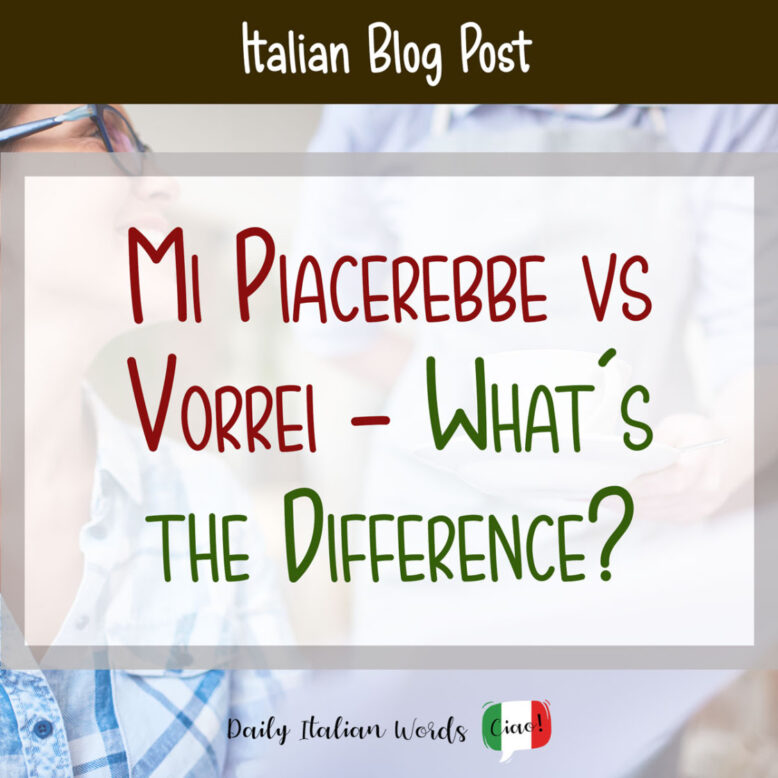In Italian, there are two main ways to translate the expression “I would like…” This is because “I would like…” actually has two subtly different meanings.

On one hand, we use “I would like…” to say that it would please us to do something, even if that thing may not feasible at that moment in time. For instance:
- I would like to visit Italy one day. (It would please me to visit Italy one day.)
- I would like to learn how to play the piano. (It would please me to learn how to play the piano.)
However, we also have another use for “I would like…” which is the polite request. We use it when we need, want or desire something.
- I would like some cough medication, please. (I need some cough medication.)
- I would like to order my meal now. (I want/desire to order my meal now.)
In Italian, you must use the phrase Mi piacerebbe…, which literally means “it would please me…“, for the first interpretation. It is mostly used when you are daydreaming about doing or having something at some point in time. You would never use it to order something at a restaurant, for example, because there is no wishful thinking involved – in fact, there is a 99.9% probability you will get what you asked for within an hour of ordering!
- Mi piacerebbe conoscere i tuoi genitori. = I would like to meet your parents.
- Mi piacerebbe imparare il tedesco, ma non ho tempo. = I would like to learn German, but I don’t have time.
- Mi piacerebbe avere una casa molto grande. = I would like to have a very big house.

As for Vorrei…, it is mostly used for the second interpretation and, being the conditional form of the modal verb volere (to want), it literally means “I would want…”. It tends to be limited to situations where polite, direct requests are made, such as eating out at a restaurant or buying things in a shop.
- Vorrei una birra, per favore. = I would like a beer, please.
- Vorrei iscrivermi a questo corso. = I would like to sign up for this course.
- Vorrei che mi dicessi la verità. = I would like you to tell me the truth.
- Vorrei venire con voi. = I’d like to come with you.

To get a clearer idea of the difference, let’s look at two examples in which the only part that changes is “I would like…”:
Mi piacerebbe mangiare una pizza stasera.
I would like to eat a pizza tonight.
In this first example, the speaker is simply stating their desire for pizza, without any concrete plan to order one. They are expressing a wish that may or may not be fulfilled.
Vorrei mangiare una pizza stasera.
I would like to eat a pizza tonight.
In the second example, the speaker is clearly stating their intention to eat pizza that evening, and is most likely ready to pick up the phone and book a table at the local pizzeria.

But what if you aren’t at a restaurant and instead, have been invited to someone’s house for dinner? In this case, it is actually more natural to use Mi piacerebbe… in the place of Vorrei…, as the latter can sound colder and more formal.
Posso offrirti qualcosa? – Mi piacerebbe un caffè, grazie.
Can I get you something? – I would like a coffee, thanks.
Note that both forms can be followed by a verb in its infinitive form, noun, pronoun or subordinate clause.
- Vorrei andare / Mi piacerebbe andare = I would like to go
- Vorrei un buon caffè / Mi piacerebbe un buon caffè = I would like a good coffee
- Vorrei questo / Mi piacerebbe questo = I would like this
- Vorrei che tu… / Mi piacerebbe che tu… = I would like you to…
One last thing to note is that there is some overlap between the two expressions. For instance, when the word quanto (how / how much) is added before mi piacerebbe or vorrei, there is no significant difference in meaning – both convey a desire that may or may not be realised.
- Quanto mi piacerebbe rivederti! = How I would like/love to see you again!
- Quanto vorrei rivederti! = How I would like/love to see you again!
Heather Broster is a graduate with honours in linguistics from the University of Western Ontario. She is an aspiring polyglot, proficient in English and Italian, as well as Japanese, Welsh, and French to varying degrees of fluency. Originally from Toronto, Heather has resided in various countries, notably Italy for a period of six years. Her primary focus lies in the fields of language acquisition, education, and bilingual instruction.


